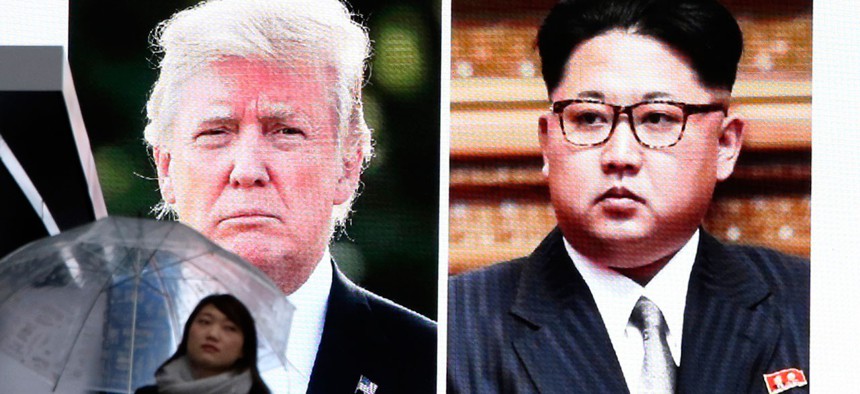Why a Meeting Between Donald Trump and Kim Jong-Un Is So Risky
In international diplomacy, the leader-to-leader meeting is the highest level of commitment available.
Donald Trump’s meeting with Kim Jong-un is a greater concession than he likely understands—and a bigger risk. But why should the presence of two humans in a room have such high stakes?
The reason a U.S. president has never met a North Korean leader is that the U.S. and North Korea have been, and continue to be, at war. Since 1953, a ceasefire has made that conflict largely symbolic, with suffering limited to South Koreans killed in provocative strikes, and the North Koreans who suffer in a gulag state or die fleeing it.
In international diplomacy, the leader-to-leader meeting is the highest level of commitment available. No prior White House would send the president into a summit that has not been pre-scripted with guaranteed results. Should there be no agreement, there is no face-saving blame to be put on negotiators, and little room left for diplomacy. And while the White House says this meeting is not a negotiation, that only raises the question of what the president is even doing there.
To entice Trump, North Korea said it would suspend the nuclear and missile tests it uses to protest military exercises between the US and South Korea. This says more for the success of the North’s nuclear weapons program than it does for the U.S.’s tightening sanctions. Why launch another rocket to gain attention when you can simply demand a meeting with the president of the United States? (Indeed, this is the literal plot of a North Korean propaganda film.)
For his part, Trump will demand an end to North Korea’s nuclear program, which Kim will not surrender without concessions of his own. Reductions in sanctions and an increase in aid could be part of a plan to step down weapons production—although this is the framework of the nuclear agreement with Iran that Trump has lambasted. A push for an actual peace treaty in exchange for denuclearization would be a larger step. And then there is the question of human rights and democracy for the North Korean people; never a priority for Trump, will they be left by the wayside?
That Trump would contemplate offering compromises after years of criticizing them suggests that he has not contemplated much at all (a suspicion that accounts of his decision confirm). Meanwhile, South Korea’s dovish president, Moon Jae-in, is the prime mover behind the Trump-Kim connection. Putting his two spoiled, self-obsessed counterparts together is an extraordinary wager, motivated by impatience at decades of failure. The question is whether Trump will sit still long enough to learn what the US can offer in such talks, and what it shouldn’t.
True, it took Richard Nixon to go to China. But he only went after the groundwork had been laid.




